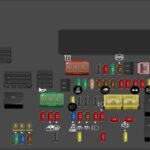The P061B diagnostic trouble code (DTC) indicates an issue with the Internal Control Module Torque Performance. This code can be frustrating, especially when it persists after multiple tuning attempts. This article will explore the potential causes of the P061B code, specifically in the context of a modified 2019 Mustang GT, and discuss possible solutions.
The P061B code often stems from a discrepancy between the expected and actual torque output. In a modified vehicle like the described Mustang with E85, high-flow cats, and a JLT 120mm intake, the engine’s performance characteristics have changed significantly. The Engine Control Module (ECM) uses complex calculations based on various sensor inputs (MAF, MAP, throttle position, etc.) to determine the expected torque. When the actual torque deviates significantly from this calculated value, the P061B code is triggered.
One possible cause is an inaccurate tune. While the vehicle has undergone multiple tune revisions, it’s possible the tune isn’t properly calibrated for the specific modifications. The tuner needs to accurately account for the increased airflow and fuel delivery resulting from the upgrades. Incorrect parameters related to fuel delivery, ignition timing, or boost control (if applicable) can all contribute to torque discrepancies.
Another potential issue is a faulty sensor. Although the original poster (OP) mentioned checking the MAF sensor and throttle body, other sensors like the MAP sensor, crankshaft position sensor, or camshaft position sensor could be contributing to the problem. A failing sensor can provide inaccurate data to the ECM, leading to incorrect torque calculations.
Mechanical problems, though less likely given the sudden onset of the issue after the new tune, can’t be entirely ruled out. Issues like a restricted exhaust, a failing fuel pump, or even internal engine damage can impact torque output. However, the OP’s description suggests a software or sensor-related problem is more probable.
Given the OP’s experience with multiple tunes, it’s crucial to work closely with a reputable tuner experienced with modified Mustangs. Providing the tuner with detailed data logs, including parameters like engine speed, load, throttle position, MAF readings, fuel pressure, and ignition timing, is essential for accurate diagnosis. The tuner can analyze this data to pinpoint the root cause of the torque discrepancy. Additionally, verifying the integrity of all relevant sensors and addressing any potential mechanical issues are crucial steps in resolving the P061B code. The fact that the prior tune also eventually triggered the code after reloading suggests a potential underlying issue beyond just the tune itself.
In conclusion, the P061B code in the modified Mustang GT likely points to a calibration issue within the tune or a potential sensor problem. Thorough data logging and collaboration with a skilled tuner are crucial for accurate diagnosis and resolution. Addressing any underlying mechanical issues should also be considered. A systematic approach involving careful analysis of data and meticulous inspection of relevant components is necessary to eliminate the P061B code and restore the vehicle’s performance.
